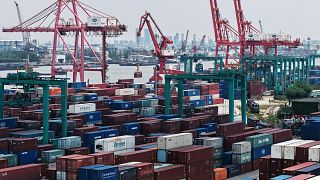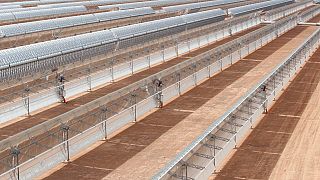Africa
2015 proved to be a tough year for Africa’s economy, faced with a slowdown in export markets and a slump in commodities prices – particularly oil, putting robust economic growth rates in jeopardy.
In Africa’s biggest economy Nigeria, the effects of a global oil price slump saw its economic growth drop to 5.54 per cent down from an estimated 6.23 percent for 2014.
Nigeria’s oil industry accounts for around 95 percent of the country’s foreign exchange earnings.
Along with the oil price slump and a postponement to the Nigeria elections, the Nigerian Naira slid to a record low, stirring concerns about political stability and the central bank’s ability to manage a currency hammered by weak oil prices.
The central bank devalued the currency by 8 percent at the end of November to try to halt the decline in its foreign exchange reserves, hit by falling oil prices.
“The slump in the oil price in my opinion, yes, it will hit us in terms of revenue because we know 70-80 percent of government revenue is based on crude but also we have to look at the other side. The drop in price means that we also import refined PMS so of course the price that we have to … the money we have to spend on subsidies to get these refined products would also go down because the price in international market has gone up.” said Yemi Kale, the Statistician General of the federation and the Chief Executive Officer of the National Bureau of Statistics.
Nigeria’s economic woes also trickled down to some of the biggest firms in the country, including Nestle, which saw its capital expenditure slow to its lowest level in five years, as a result this saw currency devaluation, dampening customer spending in Africa’s biggest economy.
A raging Islamist insurgency in the north had also limited the company’s product distribution plans.
“I think overall the consumer sentiment is definitely much lower, so confidence in the market is lower, so if you look at our customer confidence it is certainly being impacted by the challenges that we face in Nigeria. The challenges are many, and yes it is about the oil price, yes it is about the currency, it is about the uncertainty of the economic climate,” said Nestle Nigeria CEO Dharnesh Gordhon.
Unrest in Ghana
In nearby Ghana, once hailed the most attractive countries in Africa for investors because of its stable democracy and middle income status, a struggling economy saw recurring nation-wide protests against what Ghanaians say was the government’s mishandling of the economy.
Protestors march in #Ghana. http://t.co/WZpLs8w2dm #protests #FindyrReporter Get more news at http://t.co/hMRfebZrVI pic.twitter.com/rIQQv6Rz0H
— Findyr (@findyr) julio 20, 2015
Ghana’s government and the International Monetary Fund (IMF) signed a three-year funding deal worth 940 million US dollars that led to hopes of restoring fiscal stability.
“The original source of our problems have been lack of discipline in the economic management, in other words that other expenditures, extra budgetary expenditures, all those things, single sourcing without going through the procurement law and all that, has brought us to this stage. What the IMF intervention is doing basically is to help to instil discipline in the management of the finances of this economy, so that things can be stabilise for private enterprise to boom and pick,” said Owusu Afriye Ajotok, a member of the opposition.
But it was not all gloom for the continent.
In June, representatives from 25 African nations signed an initial agreement to create a free-trade zone linking three economic blocs that would unite 57 percent of the continent’s population.
The deal also intends to reduce trade barriers that will bring down prices, and boost economic activity between African countries, which has long been hampered by many factors including poor infrastructure.
Our #ForesightAfrica preview of how mega-regional trade agreements will affect African trade in the years ahead: https://t.co/G6zVM1btSX
— Brookings Global (@BrookingsGlobal) enero 1, 2016
Although analysts say that the agreement looks like a progressive step on paper, they are skeptical of its success, as it will require negotiations and ratification by national parliaments.
“The challenges are that it is a very bureaucratic system. These countries, some of them are Arabic speaking, some of them are English speaking, some of them are French speaking, I mean it cuts across; the infrastructure doesn’t support and facilitate this, because you cannot drive a car or enter a train from Cairo to Cape Town, right? So, it’s a very very elegant concept but it’s going to take a long time to accomplish and not to talk of when you will see the benefits. The benefits will take much longer time to accrue for the participating countries,” said Nigerian analyst, Bismarch Rewane.
Zimbabwe’s New Deal with the IMF
In southern Africa, Zimbabwe’s crumbling economy was dealt a new blow when the International Monetary Fund (IMF) announced that economic growth would be likely to slow.
The government forecast growth this year of 3.2 percent, but analysts said weak commodity prices; patchy rainfall and company closures as a result of cheap imports and high interest rates could curtail the economy’s growth.
“The economic outlook, we have to say remains difficult. The external position is precarious and the country is in debt distress. Growth has slowed down, it’s likely to weaken further” said Domenico Fanizza, head of an IMF review team.
China cancels $40M Zimbabwe debt in return for Yuan as official currency. Mobile wallet/currency gamification IRL! https://t.co/9T7Ju2tJge
— Rohin Dharmakumar (@r0h1n) diciembre 24, 2015
Zimbabwe’s foreign debt is $9 billion. It makes token monthly payments of $150,000 to clear $125 million in IMF arrears.
To make matter worse, the Reserve Bank of Zimbabwe announced in June the beginning the process of demonetizing the Zimbabwean dollar, and started collecting old currency notes from the public.
The unloved Zimbabwean dollar, ravaged by hyperinflation that peaked at 500 billion percent in 2008, ceased to be legal tender on June 12 as the southern African country switched fully to the U.S. dollar.
“A lot of people were quite aggrieved as they felt they lost a lot of money after we had converted in 2009 to United States dollars. As a chamber of commerce we believe this could be the right move by the government in trying to restore sanity not only in the financial sector,” said Christopher Mugaga, CEO of Zimbabwe’s Chamber of Commerce.
Kenya Airways facing turbulences
In eastern Africa, one of the continent’s biggest airlines faced uncertainty when Kenya Airways announced plans to sell off part of its old fleet and some land to see the national carrier through a cash crisis caused by a drop in passenger numbers.
But CEO Ngunze remains optimistic about the carrier’s future despite the challenges.
“Today we are focused on making sure that one — we are commercially and financially efficient and that’s why we are focusing on the commercial side of the business to make sure we are taking all the opportunities we can, even in a difficult commercial space with security concerns around us,” said Mbuvi.
But for Kenya’s biggest telecoms operator, Safaricom business went from strength to strength.
It announced a push to expand its mobile financial services and Internet access as the next big areas of growth after calls as it builds up its 3G and 4G network.
“Customers’ needs are changing rapidly, customers behavior is changing rapidly. You know at the beginning of last year if you would have asked me when exactly will we roll out 4G and how quickly would we do it, I wouldn’t have been able to say to you that by the end of the financial year which was end of March we would have rolled out two hundred and thirty something LTE base stations,” said Bob Collymore.
Ethiopia enjoys a cold beer
In neighbouring Ethiopia, Heineken looked up to the country’s rising incomes to fuel rapid expansion of the beer market in Africa’s second most populous country, where the group is the first of the big international brewers to build a new plant.
Ethiopia’s average annual beer consumption of some 5 litres per capita is about half the average level for sub-Saharan Africa, excluding South Africa, offering scope for expansion among the population.
“At the moment, we are developing our position in the local market. Like I said, our first priority is to become a national player, fulfill our ambition to become a national player all over Ethiopia. that is our first priority. Export also has to do a lot with a supply chain. In order to be able to export, you have to have a supply chain adapted to the export markets,” said Johan Doyer, managing director of Heineken Ethiopia.
Staying in Ethiopia, according to COMESA’s Leather and Leather Products Institute, vast wealth of livestock resources means Africa has enormous potential in the leather sector but studies show that only a fraction of the resource is being leveraged.
But African countries have been challenged to step in and exploit the emerging opportunities for export as part of efforts to move away from largely agriculture-based economies.
“Right now, Africa is waiting to be the next giant after India and India has just heightened its targets but one thing that comes out very clearly is the target set by India is also sending the information to Africa that we are now ready to start cooperating with them because they don’t have the resource, they don’t have the raw material that can push them from the 13 billion US dollar to 27 billion US dollar which they aim to have in the next 5 to 10 years?” said Mwinyikione Mwinyihija, director of regional trade bloc, COMESA’s leather and leather products institute.
Somalia’s isolation
This year, Somalis in the diaspora continued to face the challenges of sending money home because a growing number of banks who provide the vital lifeline closed down links with the horn of African country.
Virtually all major U.S. banks have ended remittance services to Somalia over the last few years because of regulations that hold banks responsible if they transfer funds to “terrorist” groups like Somalia’s al Shabaab.
Some 40 percent of Somalis rely on remittances for daily needs, such as food, medicines and school fees.
“We are requesting American authorities not to shut down the transfer of money and instead create a system where they can control the flow of this money, because millions of Somali people will be risking their lives and will be left vulnerable and there will be a rise in criminality,” said Abdulkadir Ali Said Juba Express Money Transfer in Mogadishu.
According to the African Development Bank (AfDB), African economies will grow 5 percent in 2016, approaching levels last seen before the 2007 global financial crisis, as economic prospects improve worldwide, the African Development Bank (AfDB).













01:30
Abu Dhabi hosts first Global South Economic Forum
01:47
Chinese city of Xuchang is world's biggest producer of wigs
01:15
U.S. considers adding more African countries to travel ban
01:10
China to remove tariffs on goods from all African countries
01:52
138 million child workers globally in 2024, number down from 2020
02:25
São Tomé and Príncipe: helping fishers and their future